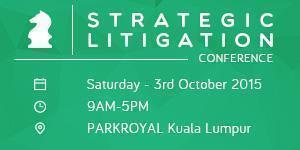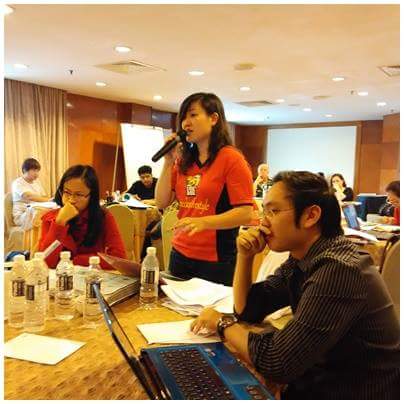
The Strategic Litigation Camp was held from 25 to 28 February 2015 at Thistle Hotel, Port Dickson. It was organised by the Malaysian Centre for Constitutionalism and Human Rights (MCCHR), also known as Pusat Rakyat LoyarBurok (PRLB) and the American Bar Association Rule of Law Initiative. The participants were mainly young lawyers and pupils in chambers.
On 25th February evening, a bus was chartered to ferry the participants from PRLB to Thistle Hotel. There were no planned activities for that night. We reached, had a late dinner, and got to know one another.
The day started early on 26th with both the morning and afternoon sessions conducted by Professor Arturo Carrillo. It was a very interactive and inspiring day. In the first session of the day, he taught us about internet freedom being the future forefront on human rights, with the main freedom of freedom of expression. We learnt that the freedom of expression has the component rights of the right to expression, the right to information and the right to access. We were exposed to basic International Law, mainly the United Nations Human Rights Committee’s work that interprets the International Convention on Civil and Political Rights (ICCPR) and their General Comments that are legally authoritative and can be used in courts. He also taught us about the permissible restrictions on freedom of expression as provided in Article 8 of the ASEAN Declaration on Human Rights, to which Malaysia’s government is also a signatory, which provided restrictions by law for the just requirements of national security, public order, public health, public safety and public morality. He drew a comparison with ICCPR where the conditions for the restriction on a freedom are it has to be legal, necessary and proportionate.
The second session was about privacy rights in the internet age where it involved more interaction, discussion and application on scenarios. It was very interesting and generated a lot of lively discussion because different people had different interpretations and opinions on what restrictions are permissible and when it violates human rights. I learnt that the restrictions are subjective to the cultural norms and constrains of a specific society.
On 27th February, the first session of the day was conducted by Ms Long Seh Lih who taught us about the application of International Law in Malaysia. We learnt that international treaties covenants or conventions are two-fold. One, it is an agreement between the states, and two, it is an agreement between states to the United Nations. The treaties are incorporated into our domestic legal system via a process called ‘ratification’. It confers a legal obligation on a state to incorporate what has been ratified into domestic law. We learnt that Malaysia also had reservations on certain clauses or provisions of various treaties and are thus not bound by it. We also learnt about strategic litigation and how it is employed in cases before our Malaysian courts. It was an interactive session where we were split into groups and were given actual court judgments where we dissected and extracted the relevant strategic litigation techniques employed in a particular case and presented it to all. We had a proud moment when the facilitator commented that my group did very well and covered the points in detail.
The second session was conducted by Professor Arturo Carrillo who further explained about strategic litigation as a concept and gave many international examples of strategic litigation and its effects on the legislative, executive, and even the judiciary. The purpose of strategic litigation may differ according to context and subject. Some may have the purpose of a broader systemic change in a country, some are for public interest litigation impact litigation which builds on constitutional recognition of rights. He taught us about the substantive and procedural elements to strategic litigation.
The third session of the day was conducted by Mr Nizam Bashir, who spoke about free speech in Malaysia. He explained how the Federal Constitution in Article 10(2) provides for the restrictions on freedoms by Parliament, which means laws by Parliament. He presented on statutes that restrict the freedom of speech, such as the Sedition Act, the Communications and Multimedia Act and Syariah Criminal Offences (Selangor) Enactment 1995. He also spoke about the recent case law in relation to freedom of expression in Malaysia.
On the last day, the session of the day was conducted by Mr Syahredzan Johan. He too spoke about the laws that restrict freedom of expression on the internet. He gave a brief historical development of freedom of expression and its relation to the development and social-political transition to the technological era of the internet. With social media, the state’s hold of controlled information is broken and activism flourished. He highlighted various laws that are used to “gag” internet users, and went into in depth detail of various provisions contained in the Penal Code and Sedition Act. He listed recent cases involving the use of Sedition Act. He provided a practical guide or notes in relation to the procedure taken by the police when arresting under sedition. He also spoke about the challenges faced today in regards to freedom of expression.
The last session was a moot session where we were split into four groups and given a scenario the day before and we were to put forward our cases before a panel of three “judges” in the Court of Appeal. The judges were Professor Arturo Carrillo, Mr Nizam Bashir and Mr Syahredzan Johan. I was on the team arguing against the constitutionality of the Sedition Act. I learnt how to draft submissions and present points before a panel of judges as if in an actual court, and also learnt to address the judges and answer the questions that were put forward by them. All three judges asked me questions and it was intimidating and exciting at the same time. At the end, the judges said that all teams did a good job and gave us general feedback. 
This camp, though in Port Dickson, was mostly work and not much play. It is evident with the fact that I only got to visit the beach for 5 minutes on the last day right before leaving the camp. The information that I received during this camp was quite an armful, but it was educational and I benefited massively from this camp. As for the people I met from this camp, they are brilliant individuals who are smart and passionate. Many new friendships were formed. This is a camp I would encourage individuals who are willing to learn and push themselves beyond their comfort zone to go for.
In fact, here comes your opportunity to learn, discuss trends, developments and opportunities for strategic litigation in Malaysia in a one day conference. Register here. You will not regret it.



I personally believe that some may have the purpose of a broader systemic change in a country, some are for public interest litigation impact litigation which builds on constitutional recognition of rights.
Now a days internet use is very common and all the institute provide the multimedia education while custom essays have made life a lot easier for all of us. Many people have a hard time filling out their essays, so that is where custom essays come through. Without them many people would still be going through a lot more difficulties.